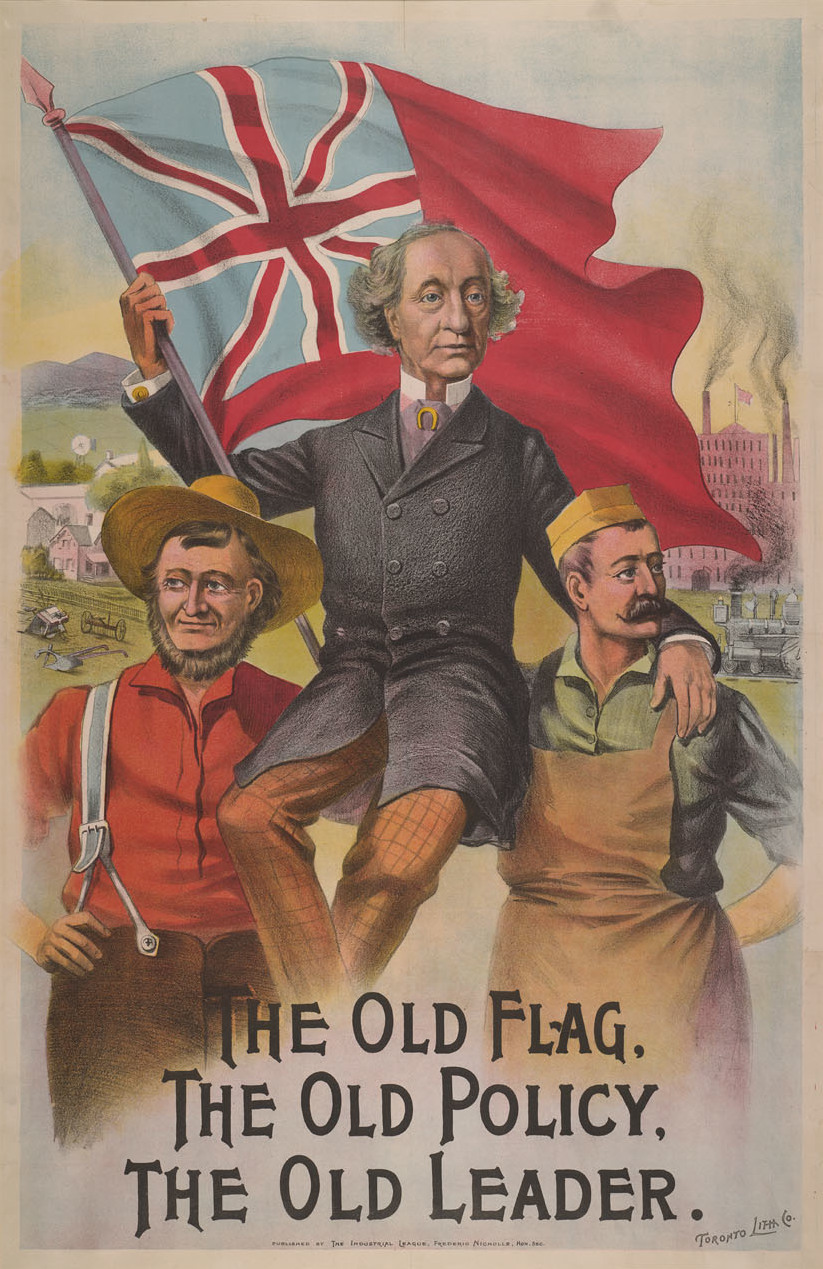1891 Canadian Federal Election on:
[Wikipedia]
[Google]
[Amazon]
The 1891 Canadian federal election was held on March 5, 1891, to elect members of the  The main issue of the 1891 campaign was Macdonald's
The main issue of the 1891 campaign was Macdonald's
 Notes:
Notes:
* Party did not nominate candidates in the previous election.
1 One Nationalist candidate was elected by acclamation.
2 The Parliamentary website identifies two candidates in Nova Scotia as being "Progressives". This may be an error.
Acclamations:
The following Members of Parliament were elected by acclamation;
* British Columbia: 1 Conservative, 1 Liberal-Conservative
* Manitoba: 1 Conservative
* Ontario: 1 Conservative
* Quebec: 1 Conservative, 2 Liberal, 1 Nationalist
The Election of 1891: A Question of Loyalty, by James Marsh
{{election canada
House of Commons of Canada
The House of Commons of Canada () is the lower house of the Parliament of Canada. Together with the Monarchy of Canada#Parliament (King-in-Parliament), Crown and the Senate of Canada, they comprise the Bicameralism, bicameral legislature of Ca ...
of the 7th Parliament of Canada
Canada is a country in North America. Its Provinces and territories of Canada, ten provinces and three territories extend from the Atlantic Ocean to the Pacific Ocean and northward into the Arctic Ocean, making it the world's List of coun ...
. It was won by the Conservative Party of Prime Minister
A prime minister or chief of cabinet is the head of the cabinet and the leader of the ministers in the executive branch of government, often in a parliamentary or semi-presidential system. A prime minister is not the head of state, but r ...
Sir John A. Macdonald.
 The main issue of the 1891 campaign was Macdonald's
The main issue of the 1891 campaign was Macdonald's National Policy
The National Policy was a Canadian economic program introduced by John A. Macdonald's Conservative Party in 1876. After Macdonald led the Conservatives to victory in the 1878 Canadian federal election, he began implementing his policy in 1879. ...
, a policy of protective tariffs. The Liberals supported reciprocity (free trade) with the United States
The United States of America (USA), also known as the United States (U.S.) or America, is a country primarily located in North America. It is a federal republic of 50 U.S. state, states and a federal capital district, Washington, D.C. The 48 ...
. Canadian voters would return to the issue of free trade 20 years later in the 1911 federal election.
Macdonald led a Conservative campaign emphasizing stability, and retained the Conservatives' majority in the House of Commons
The House of Commons is the name for the elected lower house of the Bicameralism, bicameral parliaments of the United Kingdom and Canada. In both of these countries, the Commons holds much more legislative power than the nominally upper house of ...
. It was a close election and he campaigned hard. Macdonald died a few months after the election, which led to his succession by four different Conservative Prime Ministers until the 1896 election.
It was Wilfrid Laurier
Sir Henri Charles Wilfrid Laurier (November 20, 1841 – February 17, 1919) was a Canadian lawyer, statesman, and Liberal politician who served as the seventh prime minister of Canada from 1896 to 1911. The first French Canadians, French ...
's first election as leader of the Liberals. Although he lost the election, he increased the Liberals' support. He returned in 1896 to win a solid majority, despite losing the popular vote.
The Nationalist Party won a seat in Quebec. Dorchester riding elected Cyrille-Émile Vaillancourt.
National results
Results by province
See also
*List of Canadian federal general elections
This article provides a summary of results for Elections in Canada, Canadian general elections (where all seats are contested) to the House of Commons of Canada, House of Commons, the elected lower half of Canada's Government of Canada, federal ...
*List of political parties in Canada
This article lists political party, political parties in Canada.
Federal parties
In contrast with the political party systems of many nations, Canadian parties at the federal level are often only loosely connected with parties at the provincial ...
*7th Canadian Parliament
The 7th Canadian Parliament was in session from April 29, 1891, until April 24, 1896 (4 years and 360 days). The membership was set by the 1891 federal election on March 5, 1891. It was dissolved prior to the 1896 election.
It was controlled by ...
Notes
References
Further reading
*External links
The Election of 1891: A Question of Loyalty, by James Marsh
{{election canada
1891
Events January
* January 1
** A strike of 500 Hungarian steel workers occurs; 3,000 men are out of work as a consequence.
**Germany takes formal possession of its new African territories.
* January 4 – The Earl of Zetland issues a ...
March 1891